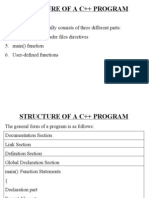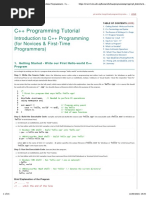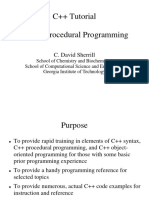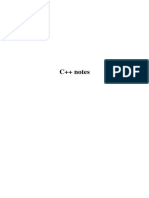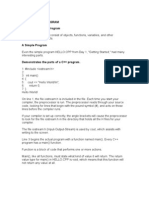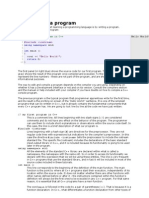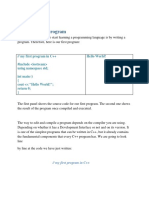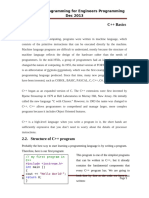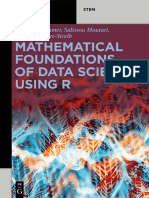0 ratings0% found this document useful (0 votes)
20 views1 Programming Fundamentals
The document discusses the structure and components of a C++ program. It describes sections such as documentation, standard libraries inclusion, function declaration, definition, main function and explains the purpose and usage of each section.
Uploaded by
hltCopyright
© © All Rights Reserved
We take content rights seriously. If you suspect this is your content, claim it here.
Available Formats
Download as PPTX, PDF, TXT or read online on Scribd
0 ratings0% found this document useful (0 votes)
20 views1 Programming Fundamentals
The document discusses the structure and components of a C++ program. It describes sections such as documentation, standard libraries inclusion, function declaration, definition, main function and explains the purpose and usage of each section.
Uploaded by
hltCopyright
© © All Rights Reserved
We take content rights seriously. If you suspect this is your content, claim it here.
Available Formats
Download as PPTX, PDF, TXT or read online on Scribd
You are on page 1/ 7
Program Structure
• // Simple C++ program to display "Hello World"
• // Header file for input output functions
• #include<iostream>
• using namespace std;
• // main function -
• // where the execution of program begins
• int main()
• {
• // prints hello world
• cout<<"Hello World";
• return 0;
• }
• This section comes first and is used to document the logic
of the program that the programmer going to code.
• It can be also used to write for purpose of the program.
• Whatever written in the documentation section is the
comment and is not compiled by the compiler.
Documentation • Documentation section is optional since the program can
Section execute without them.
• Example:/* This is a C++ program to find the
• factorial of a number
• The basic requirement for writing this
• program is to have knowledge of loops
• To find the factorial of number
• iterate over range from number to one
• */
Linking Section
• Standard libraries section
#include <iostream>
• using namespace std;
• #include is a specific preprocessor command that effectively copies and pastes the
entire text of the file, specified between the angle brackets, into the source code.
• The file <iostream>, which is a standard file that should come with the C++ compiler, is
short for input-output streams. This command contains code for displaying and getting
an input from the user.
• This enables the programmer to use standard input, output, and error facilities that are
provided only through the standard streams defined in <iostream>. These standard
streams process data as a stream of characters, that is, data is read and displayed in a
continuous flow.
Definition Section
• It is used to declare some constants and assign them some value.
• In this section, anyone can define your own datatype using primitive data types.
• In #define is a compiler directive which tells the compiler whenever the message is
found replace it with “factorial\n” .
• Global declaration section:
• Here the variables and the class definitions which are going to be used in the
program are declared to make them global.
• The scope of the variable declared in this section lasts until the entire program
terminates.
• These variables are accessible within the user-defined functions also.
Function declaration section
It contains all the functions which our main functions need.
• Usually, this section contains the user-defined functions.
• This part of the program can be written after the main function but for this, write the function
prototype in this section for the function which for you are going to write code after the main
function.
• Function body section
• Cout << "hello world" << endl;
• Return 0;
• The return keyword tells the program to return a value to the function int main
• After the return statement, execution control returns to the operating system component that
launched this program.
• Execution of the code terminates here.
Main function section
• int main() {}
• The starting point of all C++ programs is the main function.
• This function is called by the operating system when your program is executed by the computer.
• { signifies the start of a block of code, and } signifies the end.
• Example:
• #include <iostream>
• using namespace std;
• int main() {
• cout << "Hello World!" << endl;
• return 0;
• }
You might also like
- Embedded System Design IPCC Lab Manual BEC601100% (1)Embedded System Design IPCC Lab Manual BEC60160 pages
- Tools For Structured and Object Oriented Design - Simple Sequence Control StructuresNo ratings yetTools For Structured and Object Oriented Design - Simple Sequence Control Structures24 pages
- TLE7 CSS Mod2 Part1 Performing Computer Operation Version3 1No ratings yetTLE7 CSS Mod2 Part1 Performing Computer Operation Version3 139 pages
- CS-323 Programming Fundamentals 4 (3-2) CS-323 Programming Fundamentals 4 (3-2)No ratings yetCS-323 Programming Fundamentals 4 (3-2) CS-323 Programming Fundamentals 4 (3-2)16 pages
- Module 2 Day 1 - Sample Program and Layout of A ProgramNo ratings yetModule 2 Day 1 - Sample Program and Layout of A Program26 pages
- Lec01-02 (Topic 1 C++ Fundamentals) - v2No ratings yetLec01-02 (Topic 1 C++ Fundamentals) - v2210 pages
- Chapter 2 Basic Concepts of C++ ProgrammingNo ratings yetChapter 2 Basic Concepts of C++ Programming40 pages
- C++ Programming II: Compiled by Mr. Abunu TNo ratings yetC++ Programming II: Compiled by Mr. Abunu T85 pages
- DFC20113 - Programming Fundamentals: Learning OutcomesNo ratings yetDFC20113 - Programming Fundamentals: Learning Outcomes9 pages
- Cs 103 Computer System and Programming: Chapter 02: C++ Programming BasicsNo ratings yetCs 103 Computer System and Programming: Chapter 02: C++ Programming Basics56 pages
- An Overview of Computers and C++ Programming LanguageNo ratings yetAn Overview of Computers and C++ Programming Language53 pages
- Algorithm & Computing: Lab # 1 DE-32 DCENo ratings yetAlgorithm & Computing: Lab # 1 DE-32 DCE18 pages
- Chapter - 2 - Fundamentals of C++ Programming100% (2)Chapter - 2 - Fundamentals of C++ Programming16 pages
- Chapter 2 Fundamentals of Programming22222222100% (1)Chapter 2 Fundamentals of Programming2222222261 pages
- Introduction To Computer Programming: Instructor: Mahwish ShahidNo ratings yetIntroduction To Computer Programming: Instructor: Mahwish Shahid46 pages
- Grade 9 Notes Printed - 05 - 2010 - Storage DevicesNo ratings yetGrade 9 Notes Printed - 05 - 2010 - Storage Devices4 pages
- INF1511 - Chapter 1 - Python and Its FeaturesNo ratings yetINF1511 - Chapter 1 - Python and Its Features3 pages
- FPGA Programming Step by Step - EmbeddedNo ratings yetFPGA Programming Step by Step - Embedded4 pages
- 1-Information Technology, The Internet and YouNo ratings yet1-Information Technology, The Internet and You25 pages
- Differentiate Between Operation System and Application Software Computer ScienceNo ratings yetDifferentiate Between Operation System and Application Software Computer Science6 pages
- Sample Library For Instructions-V15 1 DOKU v1 04 enNo ratings yetSample Library For Instructions-V15 1 DOKU v1 04 en25 pages
- Dokumen - Pub - Mathematical Foundations of Data Science Using R 9783110565027 3110565021No ratings yetDokumen - Pub - Mathematical Foundations of Data Science Using R 9783110565027 3110565021431 pages
- A51 Assembler A251 Assembler: Macro Assemblers For The 8051 and MCS 251 MicrocontrollersNo ratings yetA51 Assembler A251 Assembler: Macro Assemblers For The 8051 and MCS 251 Microcontrollers245 pages
- (eBook PDF) Introduction to Programming Using Python An 1 2024 scribd download100% (2)(eBook PDF) Introduction to Programming Using Python An 1 2024 scribd download40 pages










